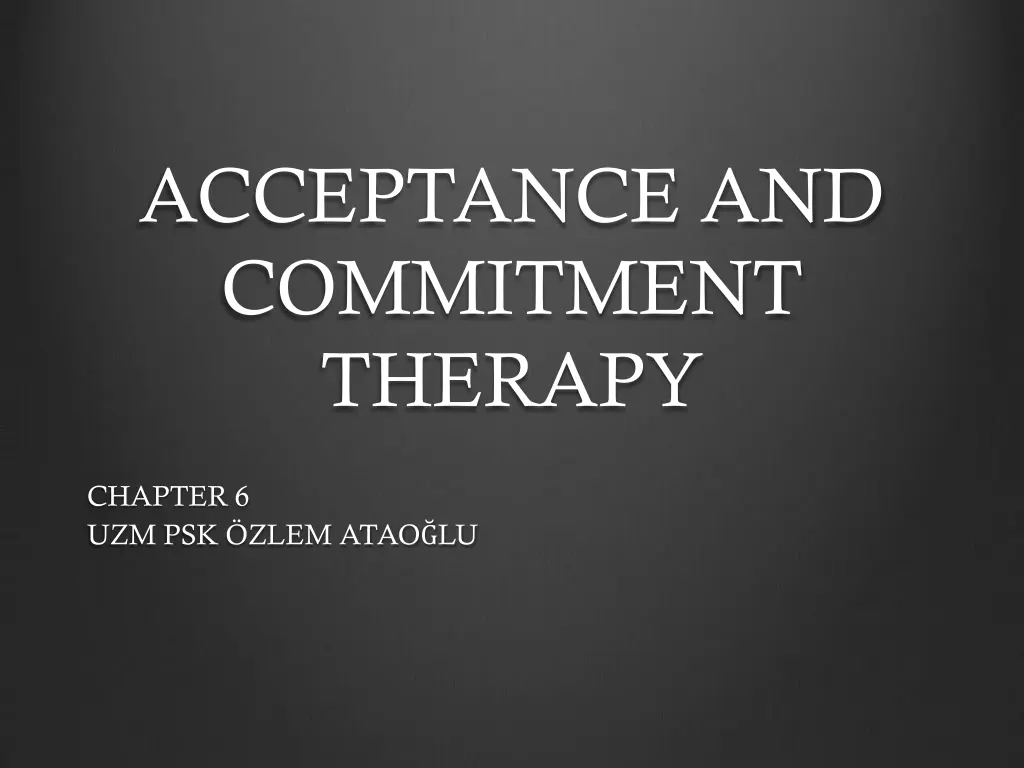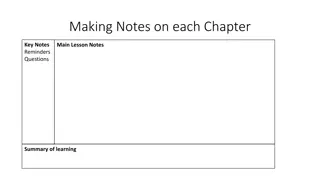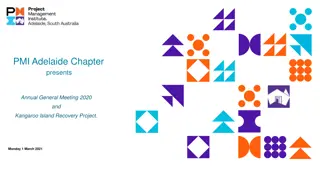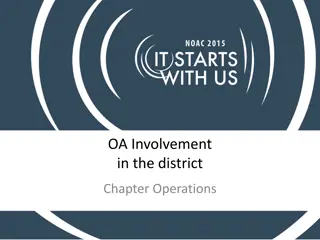
Understanding Acceptance and Commitment Therapy (ACT) Concepts
Explore the key principles of Acceptance and Commitment Therapy (ACT) such as acceptance, commitment, self-awareness, and emotional flexibility. Learn how language and cognitive processes impact emotional well-being and discover techniques to enhance psychological flexibility for better mental health.
Download Presentation

Please find below an Image/Link to download the presentation.
The content on the website is provided AS IS for your information and personal use only. It may not be sold, licensed, or shared on other websites without obtaining consent from the author. If you encounter any issues during the download, it is possible that the publisher has removed the file from their server.
You are allowed to download the files provided on this website for personal or commercial use, subject to the condition that they are used lawfully. All files are the property of their respective owners.
The content on the website is provided AS IS for your information and personal use only. It may not be sold, licensed, or shared on other websites without obtaining consent from the author.
E N D
Presentation Transcript
ACCEPTANCE AND COMMITMENT THERAPY CHAPTER 6 UZM PSK ZLEM ATAO LU
According to ACT, most of our problems and emotional sufferings are because of our use of language ACT therapists emphasize the importance of language, rather than evaluating it as an invisible, consuming progress; try to use it as a tool to use in need The ultimate goal here is emotional flexibility. Emotional flexibility is as a conscious individual, try to make a connection with right now and depending on our values either change or maintain own behaviours All of the applications of ACT aims for flexibility and sensitivity towards the functionality of the behaviour because they believe that all of the problems are because of our emotional rigidity
There are 6 main processes in ACT Acceptance Commitment Self as a context Connection with right now Values Taking action
Acceptance Acceptance is taking what is served to us, not endurance or obedience they are more passive and fatalistic Without any judgment, differentiating and adopting/embracing cognitive, emotional and bodily sensational experiences In order to develop acceptance and differentiate acceptance from endurance we can use mindfulness, gestalt therapy and experiential therapies By this way, individuals are able to see intense feelings, bodily sensations can be experienced without causing any harm. By this way people are able to open a place for them rather than suppression which leads to less disturbance
Commitment Dissociating from disturbing and painful cognitions so that these thoughts are no longer be as catastrophic as it is used to be Learning to dissociate from these thoughts, they will no longer be as effective as it was It aims to reduce the effects and importance of the context where some disturbing thoughts emerge. To do this we need to change the contexts Try to teach thoughts are thoughts, emotions are emotions, memories are memories and sensations are sensations. If the individuals know what they are there for, then they will be no harmful. Otherwise, if it is tried to be extinguished, then they will be harmful
Self as a Context Perceiving self as a whole with the term, it will be hard to think emotional flexibility. Instead we can think of self as making connections and relationships with self experiences What matters is that the context of self where these thoughts, memories, emotions and sensations have revealed Try to interpret the situations as here and now When we relate the events with here and now context means awareness
Connection with right now At that moment, what is going on there, have a full relationship, focus on what is going on and attend to it Focusing on the past events and grieve, focusing on the future and be anxious do not work instead, have a real and deep connection with right now You need to observe and differentiate what is going on AND before over judgment and labeling, you need to know to name and define the process
Values In order to have a more meaningful life, an individual should set and clarify own values and have a relationship with them Values are the reflections of what is really important deep down Who you would like to be, what is important for the self, what is meaningful, what you would like to stand by, etc. Values direct the individual s life, force to change something important in your life
Taking Action Only taking action makes a real and an important life This does not mean take action anyway BUT take action when you have a plan, basing it on your values, accept the failures even though you have tried, start all over again and again The individual should know that taking action also means responsibility Defining the aims and behave accordingly but accept the fact that there can be emotional boundaries are the basics of ACT
Emotional Flexibility Give YES answers to the following questions means emotional flexibility: Bilin li bir insan olarak, kendiniz ile sava m verdi iniz ruhsal i erik aras ndaki ayr m g z n nde bulunduruyor musunuz? (self as a context) S z konusu i eri i, ne oldu una ili kin ne s ylendi ine g re de il, ne oldu u gibi ayr msayabiliyor musunuz? (commitment) T m yle ve savunmaya ge meden ya ayabiliyor musunuz? (acceptance) Bu zamanda ve bu durumda ya yor musunuz? (connection with right now ) Se ti iniz de erleriniz var m ? (values) Sizi nereye y nlendirdi ine g re birtak m davran larda bulunmaya istekli misiniz? (taking action)






















